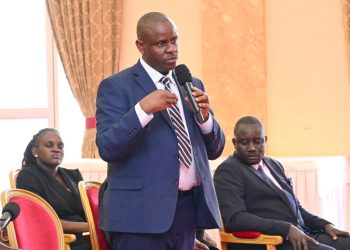The Auditor General (AG) has established that over sh835.5b was either misappropriated or misused in the 2017/2018 financial year. The report covering the last financial year noted that sh21.7b could not be accounted for, sh369.8b was diverted from items for which it had been budgeted for, sh66.9b was spent on wasteful expenditures and a total of sh377.1b was spent on undisclosed domestic arrears.
All of this added up to sh835.5b, which was either misused or misappropriated by government officials. John Muwanga, the AG and his assistant Keto Kayemba Nyapendi, together with many other technocrats from the AG’s office presented the report to the Speaker of Parliament, Rebecca Kadaga, on Friday.
Failure to account for funds
Nyapendi said whereas financial reporting by government entities has greatly improved, failure to account for funds is still a serious problem. Muwanga again expressed concern about court awards that continue to be a big challenge.
According to the report, the Government had failed to collect over sh20.6b arising from court awards it had won. At the end of the financial year under review, a total of sh625b in court awards had not been settled by the Government.
“As a result of non-payment of these liabilities, some cases had accumulated interest amounting to sh124b for close to 10 years,” the AG’s report says.
Whereas the total budget for the 2017/2018 financial year was sh30.8 trillion, only sh26.1 trillion was spent as the Government was unable to find the balance of sh4.7 trillion. The AG notes that Uganda’s public debt increased by 22% within just one year from sh33.9 trillion as at June 30, 2017, to sh41.5 trillion as of June 30, 2018.
Loan burden
The AG argues that at a debt-toGDP ratio of 41%, Uganda’s public debt, although still below IMF’s risky threshold of 50%, is unfavourable because the country’s tax-to-GDP ratio is only 14%. This means the country does not have the capacity to generate adequate revenue to pay back the loans.
“About 50% of the loans sampled, totalling sh3.9 trillion, will expire in 2020. If the Government is to service the loans as projected in the next Over sh835b misused in 2017-2018 two financial years, it would require spending more than 65% of the total revenue collections, which is over and above the historical sustainability levels of 40%,” Muwanga argued.
This means that, increasingly, a bigger portion of the Government tax revenue collection will be going towards debt repayment.
The portion of the national budget spent on debt repayment has been increasing in the last three years, from sh4.6 trillion in the 2016/2017 financial year to sh9.6 trillion in the 2018/2019 financial year, which is 58.5% of the total revenue collection target of sh16.4 trillion.
Interest payment alone for both external and domestic loans amounted to sh2.3 trillion, which is 17% of the total revenue collections and, therefore, above the limit of 15%, which was set in the Public Debt Management Framework of 2013.






























































